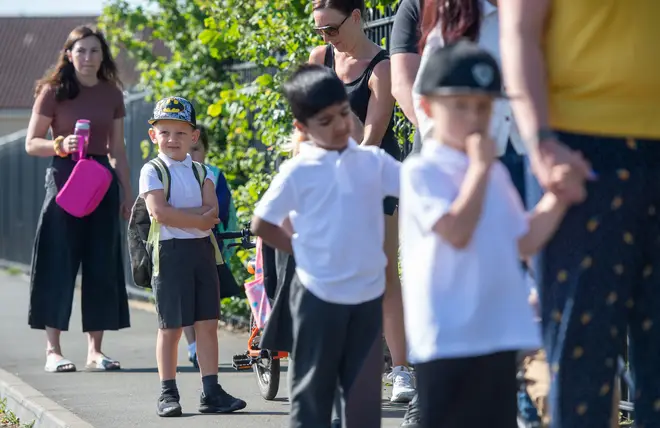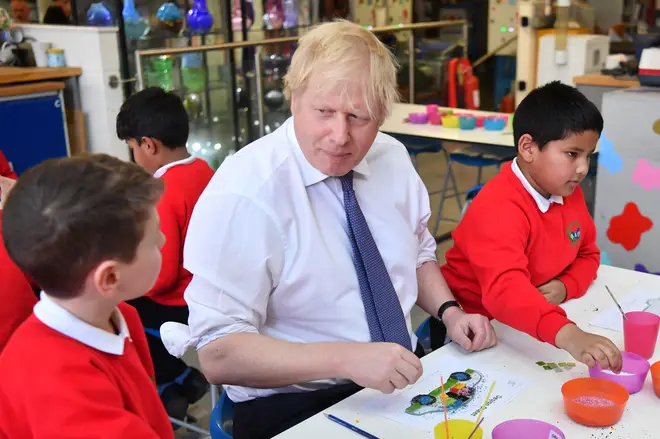
Ian Payne 4am - 7am
20 July 2020, 09:22

Gavin Williamson explains how extra school funding will be spent
All state schools in England are to receive an increase in funding of at least 2 per cent next year, the Prime Minister has confirmed.
Under the settlement, secondary schools will attract a minimum of £5,150 per pupil – up from £5,000 this year – while primary schools will get at least £4,000 per pupil, up from £3,750.
The Department for Education (DfE) said the annual increase of £2.2 billion would see most local authorities receive rises of at least 3% per pupil.
There will be smaller rises for some “historically higher funded” local authorities, while small and remote schools in rural areas will get additional cash reflecting the particular pressures they face.
Speaking with Nick Ferrari on LBC, Education Secretary Gavin Williamson said: "Broadly, this is about the announcement of extra money for the next academic year.
When asked what the money will actually buy, the Education Secretary said: "The money is there to be really targeted at the educational needs of children, and we've looked closely at all the evidence for how do you help children catch up when they have suffered the loss from not being in education.
"We all tried our best in terms of home educating but there is no substitute to being in a class with a teacher at the front of it."

"Small groups of children will be supported and tutored in the areas they are most weak in and this really does have a benefit and this is what we are aiming to deliver.
"Schools can spend the money how they wish but we would really encourage them to look at small group tuition and giving targeted extra support.
"This might be outside of school hours, after school or even at Saturday camps, which some schools are trialling around the country.
When asked about how much money the funding will mean for each individual pupil, Mr Williamson explained: "It translates to roughly about £80 per pupil. This can give schools the extra support, resource and ability to flex staffing.
When questioned on how much this amount of money can actually help pupils, Mr Williams said: "The £80,000 per school means schools could bring on two more teachers to support pupils, use it for overtime for teachers, it gives a lot of extra flex within a budget."

Labour said the increases would still leave schools worse off than they were when the Conservatives first came to power in 2010.
The increase is the second instalment of a three-year settlement which will see annual funding rise by £7.1 billion over the period.
The Prime Minister said: “Every child deserves a superb education – regardless of which school they attend, or where they happened to grow up.
“That is why we are providing additional funding now and for the future for every school – with those historically underfunded receiving the greatest increase.”
Education Secretary Gavin Williamson said: “This year has been incredibly challenging for schools, teachers and students due to the Covid-19 outbreak.
“Not only are we confirming another year of increased and better-targeted funding for our schools, but with our transformative national funding formula we are making sure the money is distributed fairly across the country so all schools can drive up standards.”

Maltings Academy school's plans for returning students
The DfE said schools would also benefit from the Government’s one-off £1 billion Covid-19 “catch up” package to make up for the impact of lost teaching time due to school closures.
Under the scheme a secondary school with 1,000 pupils will receive £80,000 and a 200-pupil primary school will receive £16,000.
For Labour, shadow education secretary Kate Green said the increases would still not reverse the austerity cuts to school budgets under the Conservatives.
“The fact is schools will still be worse off in 2023 than they were in 2010 under these plans, as a direct result of the Conservatives’ decision to cut school budgets,” she said.
The Association of School and College Leaders (ASCL) welcomed the announcement that the Government was continuing to deliver on the three-year settlement but said it was “disappointed” it had not addressed the costs of bringing back schools safely after the lockdown.
“It presently has no plans to reimburse additional costs incurred as a result of implementing the safety measures which must be introduced to enable the return of all pupils,” said ASCL general secretary Geoff Barton.
“These include extensive cleaning schedules, large quantities of hand sanitisers, extra hand-washing facilities, and cover for staff who are unable to attend because they are self-isolating.
“Schools’ budgets are very tight and they simply do not have enough money to cope with a national emergency.”
Nick Brook, deputy general secretary of the NAHT school leaders’ union, welcomed the additional funding for smaller schools but warned the money from the “catch-up” package may not be enough.
“A per-pupil allocation will take account of the size of the school but is unlikely to reflect the scale of the challenge faced,” he said.
“Schools serving the most deprived communities may find that additional funding may not go far enough to address the true cost of this crisis.”